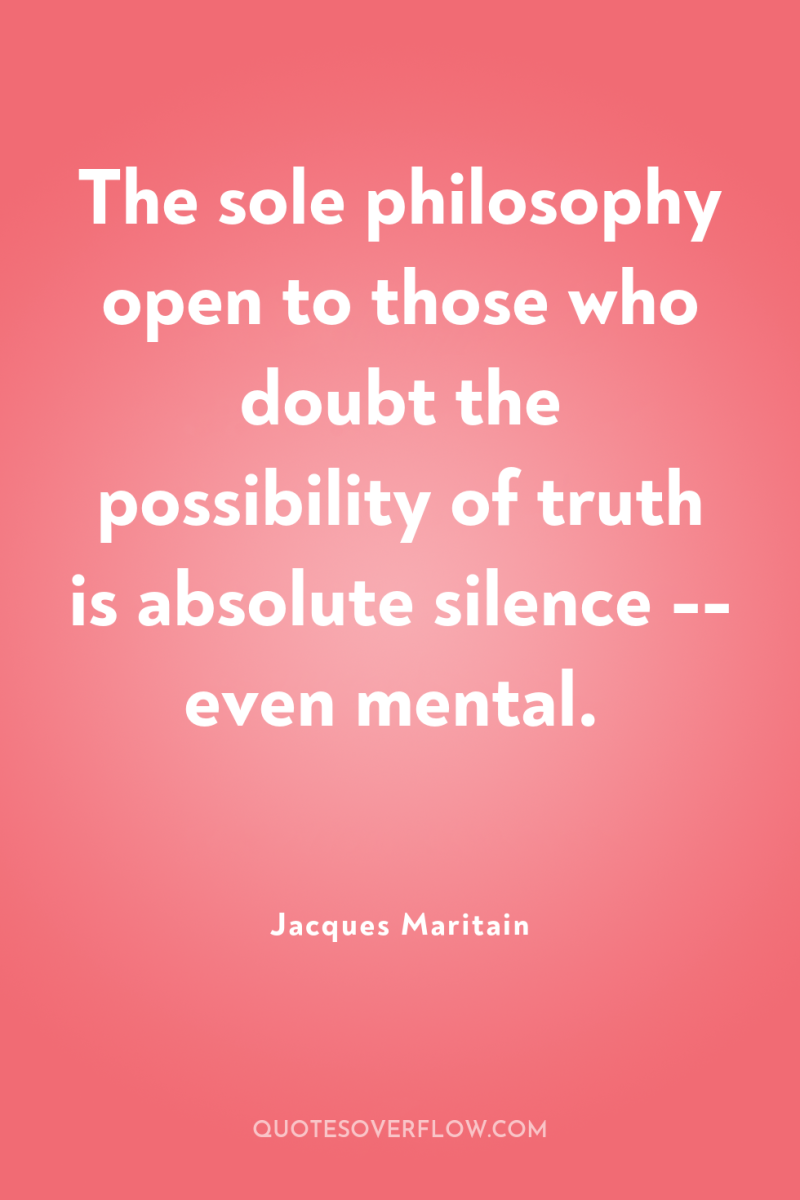
1
The sole philosophy open to those who doubt the possibility of truth is absolute silence -- even mental.Jacques Maritain
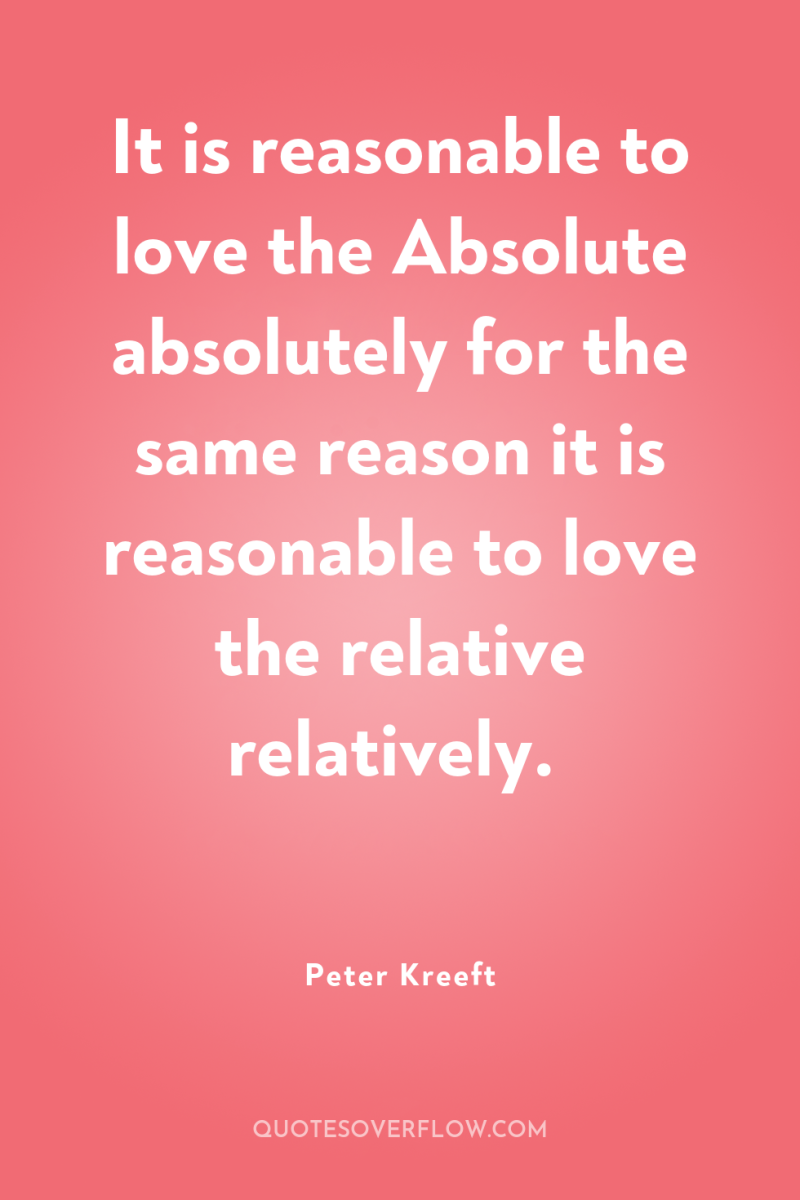
2
It is reasonable to love the Absolute absolutely for the same reason it is reasonable to love the relative relatively.Peter Kreeft
3
Truth is what your contemporaries let you get away with.Richard M. Rorty
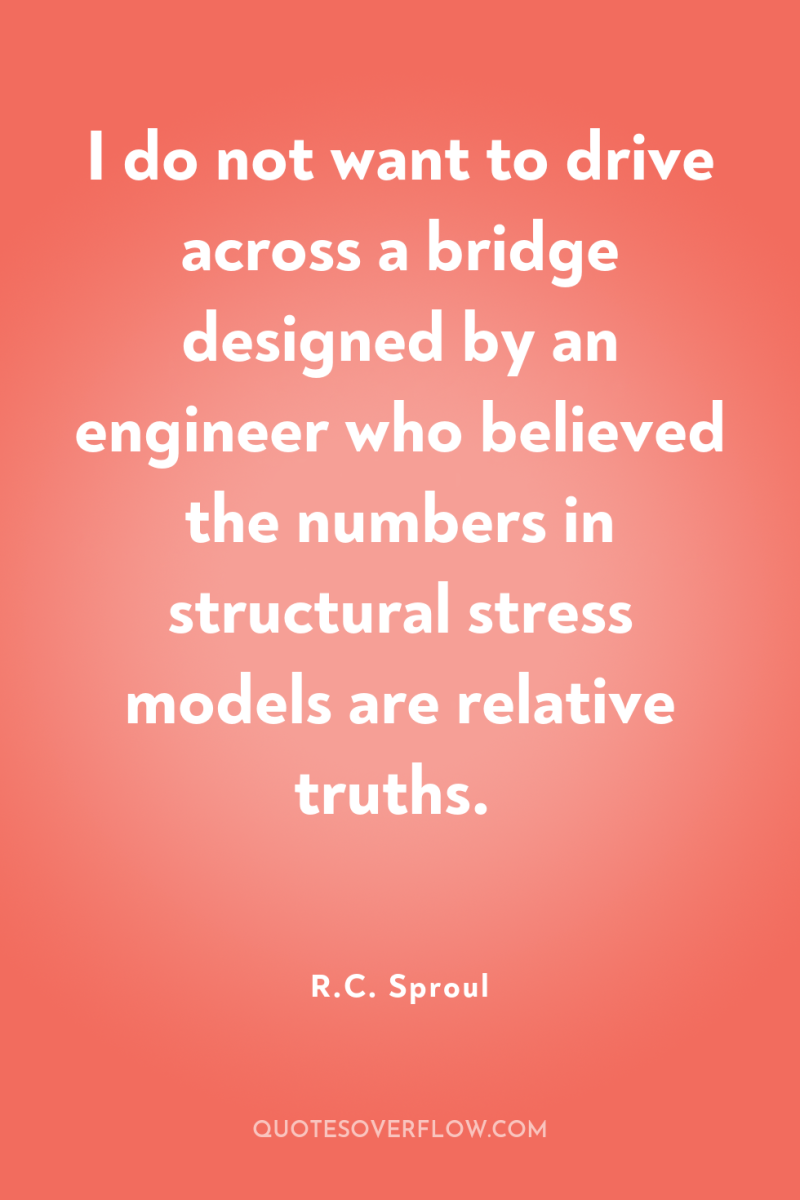
4
I do not want to drive across a bridge designed by an engineer who believed the numbers in structural stress models are relative truths.R.C. Sproul
5
It's God that's worrying me. That's the only thing that's worrying me. What if He doesn't exist? What if Rakitin's right -that it's an idea made up by men? Then, if He doesn't exist, man is the king of the earth, of the universe. Magnificent! Only how is he going to be good without God? That's the question. I always come back to that. Who is man going to love then? To whom will he be thankful? To whom will he sing the hymn? Rakitin laughs. Rakitin says that one can love humanity instead of God. Well, only an idiot can maintain that. I can't understand it. Life's easy for Rakitin. 'You'd better think about the extension of civic rights, or of keeping down the price of meat. You will show your love for humanity more simply and directly by that, than by philosophy.' I answered him: 'Well, but you, without a God, are more likely to raise the price of meat if it suits you, and make a rouble on every penny.' He lost his temper. But after all, what is goodness? Answer that, Alyosha. Goodness is one thing with me and another with a Chinaman, so it's relative. Or isn't it? Is it not relative? A treacherous question! You won't laugh if I tell you it's kept me awake for two nights. I only wonder now how people can live and think nothing about it. Vanity! .Fyodor Dostoyevsky
6
My definition of TheologyMy proverb of theology is a doctrine study of overall foundation of biblical notions, transcendence, an scriptures relativist, researcher and conservative of the Word of God with sensible and measured pursuit of infinite growth, a marriage of the spiritual knowledge (Gnosis), and unutterable love for the faith in constant pursuits and mission for truths with devoutness to prowess faith and love from faith’s vocation and noetic that’s flamed within that gives us the calling (vocation) of theologian. For theology pursues and endless journey of the Lord’s knowledge while maintaining the faith and is the strength hold of creed that manifest purpose, ontology and guardianship of the soul and wisdom, in a relation, a sound mind for divinity..John Shelton Jones
7
You heard him say it? 'Pain's the only evil I know about.' You heard that?" The monk nodded solemnly." And that society is the only thing that determines whether an act is wrong or not? That too?"" Yes."" Dearest God, how did those two heresies get back into the world after all this time? Hell has limited imaginations down there. 'The serpent deceived me, and I did eat.Unknown
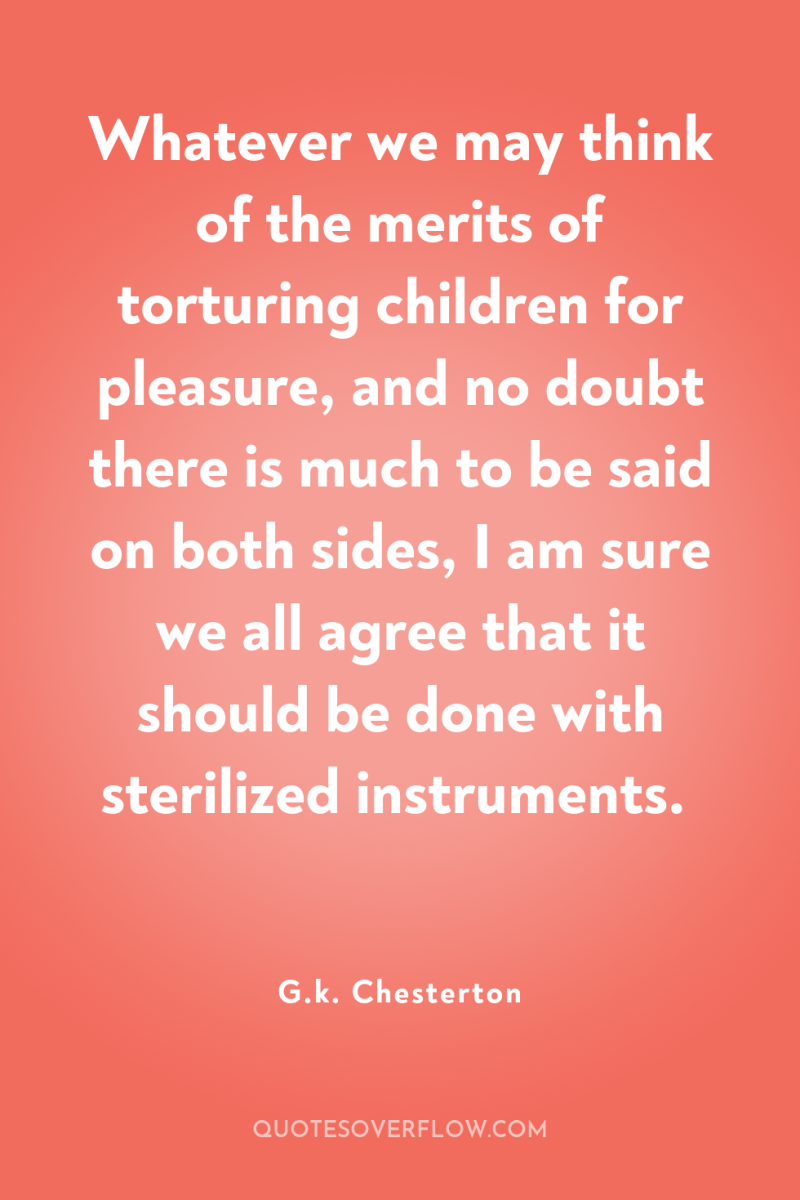
8
Whatever we may think of the merits of torturing children for pleasure, and no doubt there is much to be said on both sides, I am sure we all agree that it should be done with sterilized instruments.G.k. Chesterton
9
The only absolute truth is change, and death is the only way to stop change. Life is a series of judgments on changing situations, and no ideal, no belief fits every solution. Yet humans need to believe in something beyond themselves. Perhaps all intelligences do. If we do not act on higher motivations, then we can justify any action, no matter how horrible, as necessary for our survival. We are endlessly caught between the need for high moral absolutes–which will fail enough that any absolute can be demonstrated as false–and our tendency for individual judgments to degenerate into self-gratifying and unethical narcissism. Trying to force absolutes on others results in death and destruction, yet failing to act beyond one's self also leads to death and destruction, generally a lot sooner. .L.E. Modesitt Jr.
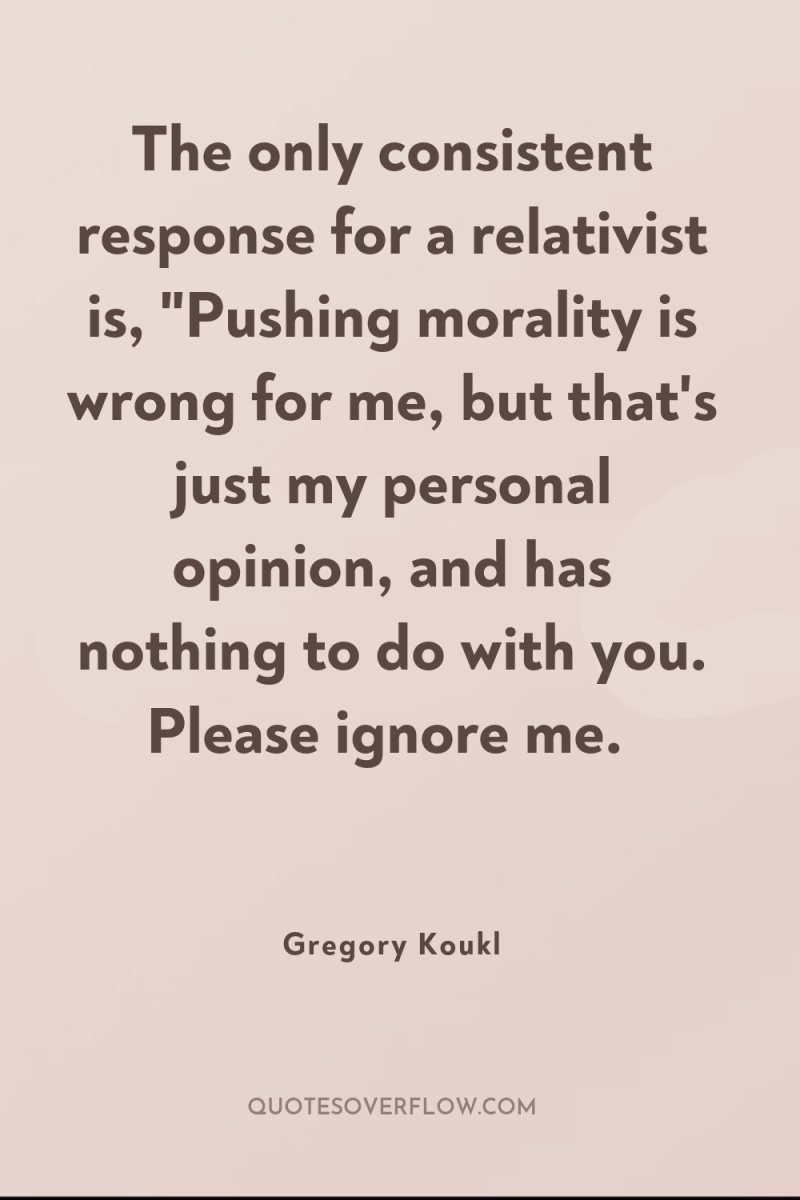
10
The only consistent response for a relativist is, "Pushing morality is wrong for me, but that's just my personal opinion, and has nothing to do with you. Please ignore me.Gregory Koukl
11
At every period of history, people have believed things that were just ridiculous, and believed them so strongly that you risked ostracism or even violence by saying otherwise. If our own time were any different, that would be remarkable. As far as I can tell it isn't.Paul Graham
12
Truth is only relative to those that ignore hard evidence.A.E. Samaan
13
The idea so commonly found that scepticism leads to toleration arises from considering the effects of scepticism in the intellectual who takes no active part - not its effects in the man of action. In the man of action, moral relativism and scepticism as to the absolute and universal value of his priunciples are no obstacle to a fanatical belief in their immediate value as his own clan at the actual moment; they do not weaken in the least his will to impose his principles. How should he glimpse a soul of truth in the principles of others, entitling them to respect, when he does not believe in noble origins of this kind even for his own principles? .Bertrand De Jouvenel
14
I have a tendency to break rules and shake things up. I would say that with me people never know what is real and what is fiction. And I like that because reality is relative.Nuno Roque
15
Given our obsession with self, it is hardly surprising we think it is fine for us to live in a world with malleable moral markers, as long as we get our own way without being bullied by others into accepting their way of doing things. We want others to respect moral boundaries that we want to be free to ignore when it suits.Stephen McAndrew
16
The idea of some kind of objectively constant, universal literary value is seductive. It feels real. It feels like a stone cold fact that In Search of Lost Time, by Marcel Proust, is better than A Shore Thing, by Snooki. And it may be; Snooki definitely has more one-star reviews on Amazon. But if literary value is real, no one seems to be able to locate it or define it very well. We’re increasingly adrift in a grey void of aesthetic relativism.Lev Grossman
17
Who can say they saw a whole play or read a whole book? Each has their own experience, their own play, their own bookJohnny Rich
18
The problem with classical disembodied scientific realism is that it takes two intertwined and inseparable dimensions of all experience - the awareness of the experiencing organism and the stable entities and structures it encounters - and erects them as separate and distinct entities called subjects and objects. What disembodied realism .. misses is that, as embodied, imaginative creatures, we never were separated or divorced from reality in the first place. What has always made science possible is our embodiment, not our transcendence of it, and our imagination, not our avoidance of it. .George Lakoff
19
When our pride usurps Truth, we walk on the shifting sands of relativism, an ego driven reality.Alisa Hope Wagner
20
Certain American uses of deconstruction, Derrida has observed, work to ensure ‘an institutional closure’ which serves the dominant political and economic interests of American society. Derrida is clearly out to do more than develop new techniques of reading: deconstruction is for him an ultimately political practice, an attempt to dismantle the logic by which a particular system of thought, and behind that a whole system of political structures and social institutions, maintains its force. He is not seeking, absurdly, to deny the existence of relatively determinate truths, meanings, identities, intentions, historical continuities; he is seeking rather to see such things as the effects of a wider and deeper history of language, of the unconscious, of social institutions and practices.Terry Eagleton
21
Gray areas are just the inability to distinguish between darkness and light.Ron Brackin
22
If you say there is no such thing as morality in absolute terms, then child abuse is not evil, it just may not happen to be your thing.Rebecca Manley Pippert
23
When we teach people that suspending moral judgments is a virtue, the necessary outcome is moral horror.Peter Boghossian
24
Those who grant sympathy to guilt, grant none to innocence.Ayn Rand
25
The dominant philosophy in today’s public university is called relativism, which categorically denies the existence of truth or moral absolutes. Those who are foolish enough to believe in such archaic notions as biblical authority or the claims of Christ are to be pitied–or bullied.James C. Dobson
26
If anyone, no matter who, were given the opportunity of choosing from amongst all the nations in the world the set of beliefs which he thought best, he would inevitably–after careful considerations of their relative merits–choose that of his own country. Everyone without exception believes his own native customs, and the religion he was brought up in, to be the best.Herodotus
27
The truth is, Jung has brought back one member of the old duality, unreason, with a new name; it is no synthesis at all, but only the latest maneuver in the war against rationality that has been conducted with rising hysteria by literary intellectuals and humanists against the laws of a culture they have reason to distrust and disobey. The Jungian theory proposes to every disaffected humanist his "personal myth, " as a sanctuary against the modern world. Against the vulgar democracy of intelligence, Jungian theory proposes an aristocracy of feeling. From this proposal derives Jung's persistent influence on modern critical and aesthetic style. .Philip Rieff
28
Every little thing makes a difference, whether you decide it yourself or whether it’s pure accident. So many people have had the whole course of their lives changed by something perfectly simple like, let’s say, crossing the street at one point instead of another.”“ Yes, yes, yes, I know, ” Stenham said with exaggerated weariness. “As far as I’m concerned that’s just as boring, and a lot more false, by the way. The point I’m trying to make is that he loves his world of Koranic law because it’s his, and at the same time he hates it because his intuition tells him it’s at the end of its rope. He can’t expect anything more from it. And our world, he hates that too, just on general principles, and yet it’s his only hope, the only way out–if there is one for him personally, which I doubt.Paul Bowles
29
Many say that it is ethnocentric to claim that our religion is superior to others. Yet isn't that very statement ethnocentric? Most non- Western cultures have no problem saying that their culture and religion is best. The idea that it is wrong to do so is deeply rooted in Western traditions of self-criticism and individualism. To charge others with the "sin" of ethnocentrism is really a way of saying, "Our culture's approach to other cultures is superior to yours. .Timothy J. Keller
30
Some argue that in time there was a noticeable change in Ratzinger's position held during the Council. However, as he himself said, and others would say about him, "It is not Ratzinger who has somehow changed and suddenly become reactionary and conservative. It is the secular culture that has drifted beyond the pale.Gediminas T. Jankunas
31
We should challenge the relativism that tells us there is no right or wrong, when every instinct of our mind knows it is not so, and is a mere excuse to allow us to indulge in what we believe we can get away with. A world without values quickly becomes a world without value.Jonathan Sacks
32
If truth and moral values are relative, one cannot claim that certain human rights are universally applicable to all cultures and all people.Stephen McAndrew
33
Each of us would like the ability to do what we want to do, when we want to do it, without incurring the moral approbation of others. We, however, tend to conveniently forget this also gives others the right to do whatever they want.Stephen McAndrew
34
The reason many are loathe to acknowledge the possibility of absolute truth is not simply because they do not wish to accept the possibility of the existence of an all-powerful, all-knowing deity. It is because they do not want to accept the consequences that follow from the existence of an all-powerful, all-knowing deity as the source of absolute moral truth.Stephen McAndrew
35
Now here comes in the whole collapse and huge blunder of our age. We have mixed up two different things, two opposite things. Progress should mean that we are always changing the world to suit the vision. Progress does mean (just now) that we are always changing the vision. It should mean that we are slow but sure in bringing justice and mercy among men: it does mean that we are very swift in doubting the desirability of justice and mercy: a wild page from any Prussian sophist makes men doubt it. Progress should mean that we are always walking towards the New Jerusalem. It does mean that the New Jerusalem is always walking away from us. We are not altering the real to suit the ideal. We are altering the ideal: it is easier.G.k. Chesterton
36
The argument that personal moral views should not be imposed on others when it comes to lawmaking is incoherent and misleading. It is incoherent because a great deal of law implicitly "imposes" a particular moral view on the wider society. It would be disingenuous to pretend that the legalization of abortion on demand or euthanasia does not impose a certain moral view on the rest of society. This is especially true when arguments for abortion and euthanasia are based on rights. The appeal to rights is a moral argument, and it is this appeal to moral authority that gives force to laws enshrining rights.George Cardinal Pell
37
There is no neutral ground when it comes to the tolerance question. Everybody has a point of view she thinks is right, and everybody passes judgment at some point or another. The Christian gets pigeonholed as the judgmental one, but everyone else is judging, too, even people who consider themselves relativists.Gregory Koukl
38
Greatness depends on where you are coming from.Chimamanda Ngozi Adichie
39
What I find particularly hypocritical and dishonest is the suggestion that secularism is synonym for “doubt” and “tolerance”, as opposed to the certainty and intolerance of religion. Since the French Revolution, secularism, when translated into social or political action, has hardly been a synonym for tolerance and scepticism, but has been instead unfailingly characterised by a presumption to occupy the moral high ground which entitles to deal out moral judgments. This self-righteousness has often extended to a point that its proponents have not hesitated to execute those who dare to dissent from the new received orthodoxy, with an unwavering certainty that they are fulfilling the momentous mission of promoting social and moral progress. It is perhaps worth reminding that communism — an ideological monster responsible for, within just a few short decades, mass murders on a scale previously unprecedented in human history — is a political manifestation of the idea of a secular society. Marxist communist ideologies are intrinsically linked to the notion of a state sponsored, and enforced, secularism. 3 Communism has never struck me as particularly tolerant or imbued with scepticism. It is indeed a shame that the ruthless dictators of state atheism — such as Stalin, Mao and Pol Pot - before butchering tens of millions of people, did not doubt for an instant of doing the right thing. .Giorgio Roversi
40
Relativism poses as humble by saying: “We are not smart enough to know what the truth is–or if there is any universal truth.” It sounds humble. But look carefully at what is happening. It’s like a servant saying: I am not smart enough to know which person here is my master–or if I even have a master. The result is that I don’t have a master and I can be my own master. That is in reality what happens to relativists: In claiming to be too lowly to know the truth, they exalt themselves as supreme arbiter of what they can think and do. This is not humility. This is the essence of pride. .John Piper
41
There is only a perspective seeing, only a perspective "knowing"; and the more affects we allow to speak about one thing, the more eyes, different eyes, we can use to observe one thing, the more complete will our "concept" of this thing, our "objectivity, " be.Friedrich Nietzsche
42
True inner righteousness does not judge according to custom but by the measure of the most perfect law of God Almighty by which the mores of various places and times were adapted to those places and times.Augustine Of Hippo
43
Are we truly committed to the notion that ideals and values vary and alter in accordance with changing conditions? Should we not question such a relativistic dogma? Is not the degree of our sensitivity to the validity of the ultimate ideals and values that fluctuates rather than the ultimate ideals and values?Abraham Joshua Heschel
44
Progress in science and technology is real, but it builds on past truths without rejecting them. Computers don’t have to be re-invented in order to keep getting better; innovations expand what they already do. Knowledge accumulates, so it can increase. Scientists and engineers know this, but artists, authors, and philosophers keep trying to start over from ground zero in the humanities. Thus, they don’t really progress–they become primitive.Unknown
45
We find that in the absence of demonstrable truth, the best we can do is to exercise the greatest diligence, humility, insight, intelligence, and industry in trying to arrive at the nearest values to truth. I hope, of course, to argue convincingly that having done this, we have an inescapable duty to seek to inculcate others with these values.Unknown
46
Whether a man is a criminal or a public servant is purely a matter of perspective.Tom Robbins
47
If it is true that we cannot possess knowledge of what is good in any absolute sense, it is equally true that we have an ethical duty to decide between what is better and what is worse.Richard Kearney
48
I don't know what it is about "magic happens"-stickers on cars but every time I see one I wanna get out my permanent marker and sneak over and write underneath it "so does cot death".Tim Minchin
49
It is arrogant to believe that you know what is true for you. Surely you know in your own life with you that you cannot be trusted.Unknown
50
This capacity for objectivity and absoluteness amounts to an existential – and “preventive” – refutation of the ideologies of doubt: if a man is able to doubt, it is because there is certainty; likewise the very notion of illusion proves that man has access to reality. It follows that there are necessarily some men who know reality and who therefore have certainty; and the great spokesmen of this knowledge and certainty are necessarily the best of men. For if truth were on the side of doubt, the individual who doubted would be superior not only to these spokesmen, who have not doubted, but also to the majority of normal men across the millennia of human existence. If doubt conformed to the real, human intelligence would be deprived of its sufficient reason, and man would be less than an animal, for the intelligence of animals does not doubt the reality to which it is proportioned. .Frithjof Schuon
51
Maybe nothing is completely true, and not even that.Multatuli
52
In post- Nietzschean spirit, the West appears to be busily undermining its own erstwhile metaphysical foundations with an unholy mélange of practical materialism, political pragmatism, moral and cultural relativism, and philosophical skepticism.Terry Eagleton
53
Relative truths can also be absolute. Relative absolute truths are like two people looking at the same coin, from two different sides, each sees a different truth and presumes they are looking at the same coin, and yet neither side can see the third side.Unknown
54
I do not have it in for relativism. In many respects I find it a fascinating, even attractive, alternative. It engenders epistemological humility, defeats an arrogant pomposity in belief, even promotes a sort of democratic ideal in matters of knowledge. Perhaps its most comforting feature is that it requires no hard work at all in the matter of justifying beliefs.David L. Wolfe
55
[Professor Greene's] reaction to GAMAY, as published in the Yale Daily News, fairly took one's breath away. He fondled the word "fascist" as though he had come up with a Dead Sea Scroll vouchsafing the key word to the understanding of God and Man at Yale. In a few sentences he used the term thrice. "Mr. Buckley has done Yale a great service" (how I would tire of this pedestrian rhetorical device), "and he may well do the cause of liberal education in America an even greater service, by stating the fascist alternative to liberalism. This fascist thesis . This . pure fascism . . What more could Hitler, Mussolini, or Stalin ask for . ?" (They asked for, and got, a great deal more.) What survives, from such stuff as this, is ne-plus-ultra relativism, idiot nihlism. "What is required, " Professor Greene spoke, "is more, not less tolerance--not the tolerance of indifference, but the tolerance of honest respect for divergent convictions and the determination of all that such divergent opinions be heard without administrative censorship. I try my best in the classroom to expound and defend my faith, when it is relevant, as honestly and persuasively as I can. But I can do so only because many of my colleagues are expounding and defending their contrasting faiths, or skepticisms, as openly and honestly as I am mine." A professor of philosophy! Question: What is the 1) ethical, 2) philosophical, or 3) epistemological argument for requiring continued tolerance of ideas whose discrediting it is the purpose of education to effect? What ethical code (in the Bible? in Plato? Kant? Hume?) requires "honest respect" for any divergent conviction? .Unknown
56
Insularity is the foundation of ethnocentrism and intolerance; when you only know of those like yourself, it is easy to imagine that you are alone in the world or alone in being good and right in the world. Exposure to diversity, on the contrary, is the basis for relativism and tolerance; when you are forced to face and accept the Other as real, unavoidable, and ultimately valuable, you cannot help but see yourself and your 'truths' in a new - and trouble - way.Jack David Eller
57
With no fact as a referent, what is normative is purely a matter of preference.Ravi Zacharias
58
No-one can own our Lord Buddha. That would be a foolish claim, but the roads that lead to him, the Way... That is a different matter. They are all filled with toll-gates, like the roads of Japan, and the monks collect the fees.Erik Christian Haugaard